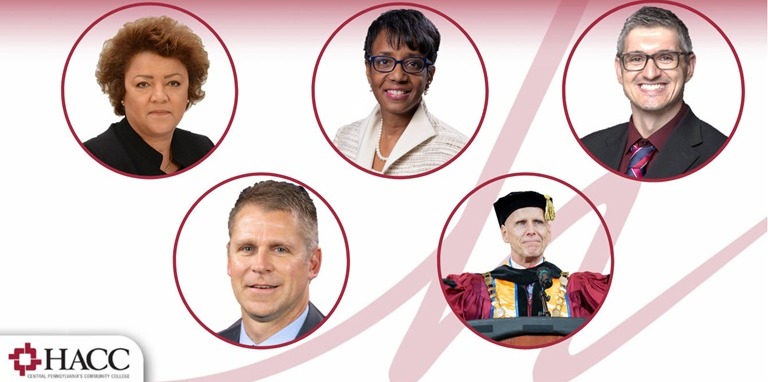HACC, Central Pennsylvania’s Community College: Flight Paths to Student Success

As part of its One College model, HACC, Central Pennsylvania’s Community College, has created a framework referred to as HawkSOAR. It consists of a collegewide cross-functional team focused on the alignment of HACC’s student success efforts. The concept stemmed from the college’s partnerships with Achieving the Dream (ATD) and the Community College Research Center (CCRC), both of which champion evidence-based institutional improvements for student success. HawkSOAR consolidates all programs into one cohesive structure to establish a strategic, data-informed culture for students and employees.
The objectives of HawkSOAR are to enhance collaboration throughout the institution by breaking down structural silos, thereby fostering a climate of cooperation. The shift centers on engaging faculty and staff strategically, promoting evidence-informed practices and continuous quality learning. The alignment of HawkSOAR’s efforts across HACC is evident through the college’s:
- Purpose statement of “Learning for all; Learning for Life” and core values, which focus on a Circle of Trust.
- 2023-2026 strategic plan, with a focus on strategic commitments 1, 2, and 5: Reimagine Employee Success Together, Reimagine Student Success Together, and Ensure Institutional Sustainability (respectively), as well as Title III SIP Grant goals and objectives.
- Partnerships with ATD, CCRC, and Complete College America Accelerator.
The overarching aim of HawkSOAR is whole college transformation to support student enrollment, retention, and completion rates. Specifically, we are leaning into HACC data to continually improve our effectiveness for the student success agenda. The four priorities are to:
- Improve credit accumulation and decrease D, F, and withdrawal (W) rates;
- Increase gateway course completion, especially math and English;
- Implement clear degree pathways aligned with student goals and needs; and
- Revamp the academic advising system to ensure that all students are able to move in, through, and out of the college in a timely fashion.
HawkSOAR began to enhance student success by providing a definition of student success; improving employees' data literacy knowledge, skills, and abilities; and implementing learning and development (L&D) practices to provide effective and efficient student support. HawkSOAR consists of and focuses on the following three workgroups.
Workgroup One: Data
Over the past 24 months, this group has been exploring opportunities and innovations to transform raw data into meaningful and trusted insights that drive positive change for both staff and students. The focus has been on math as a gateway course for student success. Through data sharing and monthly interactive dashboard exercises, employees have gained hands-on experience in reading, interpreting, and extracting valuable insights from math data, empowering them to not only make data-informed decisions but to implement specific strategies to enhance institutional effectiveness and student success.
Workgroup Two: Student Success
This workgroup has drafted and shared a definition of student success and is exploring ways to operationalize and institutionalize this definition across the college. Student success at HACC is defined as a personalized journey to achieve academic, personal, and professional fulfillment. HACC fosters an educational environment that supports students to gain economic mobility, establish a solid foundation for lifelong learning, and contribute to our communities’ evolving workforce needs. This workgroup has also focused its efforts on the development of academic pathway maps, consistent with expectations from guided pathways models. These maps are used to guide students through their college experience at HACC from admission through completion and beyond.
Workgroup Three: L&D
This workgroup was charged with creating a professional development framework and selected the New Learning Compact (NLC) framework (Bass et al., 2019) for L&D and educational change. The framework identifies evidence-based design principles that are systemic, co-constructed, equity-focused, and personally empowering for employees and students. These principles fall into four dimensions:
- Individual: Engage employees as individuals. Effective L&D programs focus on approaches to help advance learning and consider individual practice as one component of a cohesive learning experience.
- Community: Bring employees into the community by co-constructing learning opportunities.
- Institutional: Root L&D in systematic institutional support.
- Ecosystem: Consider how campuses can best engage higher education actors, such as state systems, accreditors, and national success movements, to advance high-impact professional learning.
The NLC framework's Individual and Community dimensions emphasize the importance of co-construction and effective L&D methodologies. These dimensions highlight systemic approaches, while the Institutional and Ecosystem dimensions focus on the structural context required for transformative organizational learning.
The workgroup brainstormed content to address all four dimensions and will develop a calendar for the 2025-2026 academic year. This group also piloted a focus group survey instrument and will collect more data from HACC’s five campuses. Furthermore, campus visits will give us the opportunity to promote and engage the college community at all levels and to support and encourage college employees to establish and institutionalize a culture of evidence-based practices to continuously improve student success.
HawkSOAR Summary
We understand that moving toward an evidence-informed culture takes time; an effort of this scale cannot be accomplished overnight. The HawkSOAR initiative aims to minimize the risk of depending on outdated methods as we face new challenges. HACC is committed to making meaningful changes to enhance learning and to integrate these initiatives into all aspects of our work.
This issue of Member Spotlight highlights HACC’s 2024-2025 Innovation of the Year Award winner.
Reference
Bass, R., Eynon, B., & Gambino, L. M. (2019). The new learning compact: A framework for professional learning and educational change. Every Learner Everywhere. https://everylearnereverywhere.org/wp-content/uploads/NewLearningCompact.pdf
Cavil Anderson, Ph.D., is Executive Director, Organization Development, at HACC, Central Pennsylvania’s Community College, in Harrisburg, Pennsylvania.
Opinions expressed in Member Spotlight are those of the author(s) and do not necessarily reflect those of the League for Innovation in the Community College.










